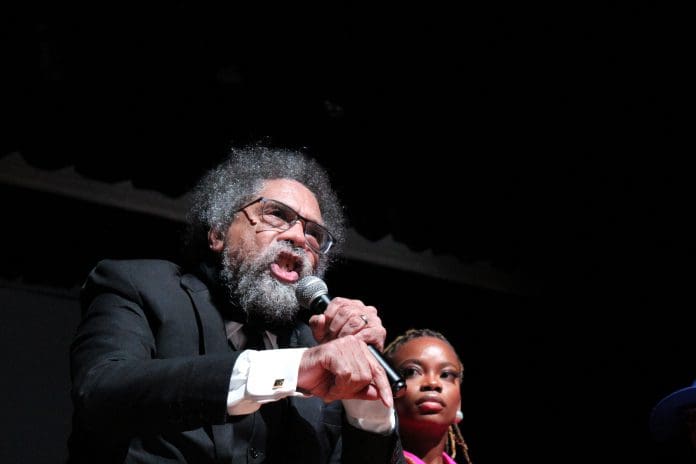American philosopher Cornel West shared his views on issues facing many Black residents in Florida during a panel discussion in Tallahassee on Saturday, a few days before the regular lawmaking session.
“We are not first and foremost antiracist. We are here because we love Black people,” West said. “And if you love Black people, then you loathe them being treated unjustly.”
About 80 people attended the Social Justice Weekend event at Godby High School on Saturday. It was organized by Jackson County-based nonprofit think tank, Street Philosophy Institute. Local activists, university students, elected officials and state and local Democratic Party leaders were among those in attendance.
“Jerry playing the drums in Sly and the [Family] Stone, wasn’t Black was he? Was he Sly’s ally? Hell no. He was in the band,” West said. “Our white brothers and sisters, brown brothers and sisters, indigenous brothers and sisters, are you going to be in the band?”
The panel consisted of seven people with experience in a range of fields, including activism, academia, law and politics.
Efforts to ban critical race theory are a continuation of history, panelists say
Gov. Ron DeSantis’s efforts to eliminate diversity programs and critical race theory from the state’s colleges, universities and K-12 schools also came up during the discussion.
“This debate over critical race theory — that’s not new,” West said. “They’ve been trying to miseducate Black people for four-hundred years. They kept us away from reading and learning how to read and write for over two-hundred and forty-four years.”
Last year, Republicans in the legislature banned critical race theory from K-12 classrooms. Legislation filed this year would do away with majors and minors in critical race theory, gender studies and intersectionality or those that require courses in those subjects. It would eliminate DEI programs and initiatives that aren’t federally mandated.


“The Civil Rights Movement of the 60s is where the idea of equity, diversity and inclusion comes from,” said Tallahassee-based Attorney Fred Flowers, who helped found the Civil Rights Institute at Florida State University, during the discussion. “Mr. Governor, are you against equal opportunity under the law, equal jobs?”
Panelists questioned why the governor won’t sit down and talk with them to hear their concerns about education and other issues.
“We can’t have a reconciliation of the movement toward social justice, until we reconcile the truth, and we can’t do that until we look at the true American history.”
Resistance from Democrats isn’t enough to block further restrictions on how race and gender are taught in schools
Democrats in the state legislature have pushed back against many of these policies, but the party has been in the minority for decades.
This year Republicans have a supermajority after Democrats reported staggering losses in the 2022 midterms, including key statewide races, such as the one for U.S. Senate.
“That was the most disgraceful vote that had ever been taken in the history of Florida,” said Judy Mount, vice chair of the state Democratic Party, who also spoke on the panel. Mount was referring to former Rep. Val Demings’ loss by more than a million votes to Sen. Marco Rubio, even though Demings had raised more money than Rubio.


Mount also chairs the Jackson County Democratic Party. Her get-out-the-vote efforts include going to people directly where they are and engaging them. “I go to the people,” she said. “We go to the projects; I go to the wealthy side. But you have to get to the people.”
The Florida Democratic Party recently elected Nikki Fried to serve as the state party’s new chair, as its members try to figure out how to boost the party’s voter registration numbers, motivate higher turnout for Democrats and raise more money.
History of Claude Neal lynching was largely kept hidden from younger generations in Marianna


During the event, FSU literary professor Lamar Wilson shared his documentary “The Changing Same,” a film about Wilson’s annual marathon to expose the history of the Claude Neal lynching in Marianna.
Wilson says he never learned about the infamous lynching in school, even though it was one of the most brutal in American history and happened in his hometown. He says he learned about it after reading the book “The Anatomy of a Lynching” by historian James McGovern, which Wilson found at the Jackson County Public Library.
Wilson later started a marathon in October on the anniversary of Neal’s lynching death. After that, he says, the book was temporarily removed from the library. Today the online catalog shows that the book is available, but it’s not allowed to be checked out.
Many older African American residents in Jackson County who were alive when Neal was lynched didn’t speak about the tragedy out of fear of what might happen to them or their loved ones, Wilson said.
“They were afraid for their children and their children’s children,” he said. “They did not want violence to come to them.”
“I’m always concerned about what could happen to me or my loved ones for what I’m saying,” Wilson said. “But I cannot allow fear to keep me from speaking what is documented fact and truth.”
9(MDA4MzU1MzUzMDEzMTkyMzAwMzY5MjY1Mw004))
9(MDA4MzU1MzUzMDEzMTkyMzAwMzY5MjY1Mw004))


